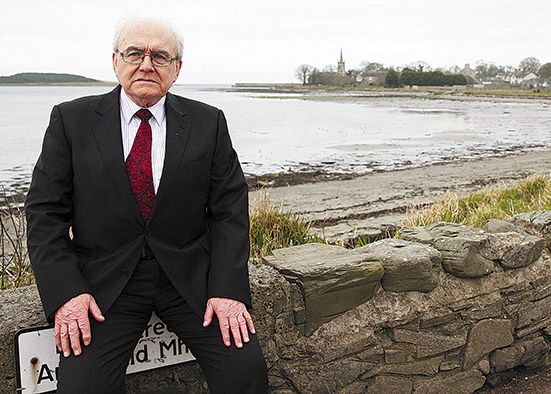Publican and politician who rubbed shoulders with the top world leaders
Publican and politician who rubbed shoulders with the top world leaders
19 March 2025

THE funeral has taken place of Malachi Curran who left an indelible mark on the district and Northern Ireland through his work in many varied fields.
Mr Curran – who would have celebrated his 86th birthday next month – was laid to rest yesterday following a service of Requiem Mass at St Patrick’s Church in Downpatrick.
He was one of Northern Ireland’s former high ranking senior civil servants, a member of the former Down Council and publican at the Anne Boal Inn in Killough which overlooks the village’s stunningly picturesque bay.
Mr Curran was also one of the signatories of the historic Good Friday Agreement in 1998.
He was the former leader of the Northern Ireland Labour Party and a politician who rubbed shoulders with the likes of Nelson Mandela and former US President Bill Clinton.
When history and political students in 20 or 30 years’ time research the discussions which led to the Good Friday accord, Malachi Curran’s name will be among those who played significant roles alongside David Trimble, John Hume, Gerry Adams and US Senator George Mitchell reaching a political agreement to move forward.
While at the helm of the smallest party participating in the negotiations of the historic document which concluded during the early morning with snow starting to fall, Mr Curran’s role in the discussions was no less significant.
Born on April 17,1938, in Saul Street Downpatrick, Malachi was the second child to James and Violet Curran.
He was brother to Eileen, Desmond Colm and Annette, with Eileen and Colm sadly passing away in the last three years.
Mr Curran’s early life was split between his paternal family in Chapeltown and Sheepland where he developed his love for literature and poetry.
His uncle Hugh was an acclaimed actor and he would later be heavily involved in the Down Drama Club, developing a special love for their production of Ibsen’s A Doll’s House.
Summers were often spent with his maternal grandmother in Newcastle at her lodging house on the promenade where Mr Curran was encouraged by relatives towards his first course of study following his eduction at St Patrick’s Grammar School, reading law at Queen’s University in Belfast.
He cut short his first degree and travelled to England aged 19, staying with his sister Eileen for a short while and working in an import company before being drafted into the British Army and rising to the rank of corporal.
Mr Curran would later reminisce this afforded him the opportunity to travel the world, instil a sense of discipline and self determination that would carry him through his later life.
Following his military service, Mr Curran joined the British Labour Party and became keenly involved in the Labour and trade union movements before returning to Northern Ireland when his father was ill.
He applied for a role in the Civil Service in early 1963, his interview occurring during the great snow storm of that year.
With no available transport, he walked to Belfast, staying with some friends near Saintfield before continuing to the city on foot.
He remained in the Civil Service for over 20 years, rising to the position of deputy principal. He met and married Marian Mongan and they subsequently had three children, Michael, Hugh and Sarah.
Mr Curran was also heavily involved in the trade union movement while in the Civil Service, rising to senior positions in the Irish congress of trade unions.
He was also heavily involved with the civic week programme in the 1960s in Downpatrick, helped co-found the Downpatrick Working Men’s Club in English Street in the 1970s and through the LEDU group on Down Council helped secure funding for the Down Business Park in the 1990s.
After leaving the Civil Service in the late 1980s, he purchased the Anne Boal Inn in Killough following the death of his friend, Anne Boal, who was the previous owner.
Mr Curran then enjoyed a long career both as a publican and in public service, first as a councillor before he was elected to the 1990s peace talks as an independent Labour politician, taking the position as leader of the Labour coalition and one of the signatories of the Good Friday Agreement.
Following the talks, Mr Curran retired from public life and continuing his career as a publican, enjoying a long career in the Anne Boal Inn.
He especially enjoyed events to draw the wider community such as a vibrant quiz night hosted by his lifelong friend, Brian McKinney, music nights in latter years and his favourite traditional Burns Night supper each January.
As his family grew through marriage, Mr Curran was proud to welcome four grandchildren and often expressed his hope the world they inherit would be better than the one he entered.


